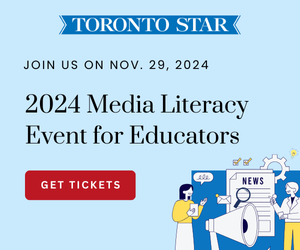
Science plays an important part in our everyday lives. But according to a recent survey, one out of three Canadians don’t feel they really understand it.
The Ontario Science Centre posted a “science literacy” survey online last August. People answered questions about how well they understand scientific information, and whether they believe and trust information they get about science from the media.
Most of the people who took the survey consider themselves “science literate.” That means they feel they have a reasonable knowledge of things like how science is done (scientific methods) and recent discoveries in science.
However, 33% (one third) of those taking part said they don’t feel they generally understand those things.
About the same number of people said they don’t really understand most of the scientific news that’s reported in the media.
Dr. Maurice Bitran, CEO and Chief Science Officer of the Ontario Science Centre, said that it’s important for people to understand science so we can make good decisions as a society about how to handle problems like climate change.
The survey also asked people which sources they trust to provide “accurate and fact-based” information about science. About nine out of 10 people said the sources they trust most are museums, school and universities.
Only about six out of 10 people trust the science-related information they see in news media, including newspapers, TV and websites.
Almost seven out of 10 people said they believe that news organizations only report scientific news and discoveries that support their own opinions, instead of reporting everything equally.
People were also concerned about the spread of “fake news” in the media (false information reported as fact). About 79% said they were concerned that fake news would influence people’s ideas about science.
Surprisingly, only 45% (nearly half) of those surveyed said they would trust the government to deliver accurate and fact-based information about science.
In a media release put out by the Ontario Science Centre, Dr. Bitran said that Canadians’ lack of trust in the media could cause problems.
“Our future health, prosperity and security all depend on making important, sometimes difficult, decisions based on scientific findings,” he said. “If we don’t trust the sources or don’t understand the information we are receiving, we can’t make informed decisions.”
Some other interesting statistics from the survey include:
- 43% believe that scientific findings are a “matter of opinion.”
- 47% believe that the science behind global warming is unclear.
- 80% believe that more money should be given to support science research and education.
- 82% said that they want to know more about science and how it affects our world.
Related Links
How Science Literate Are You?
http://www.chronicle.com/article/How-Science-Literate-Are-You-/229753/
Boost your scientific knowledge:
Science Max videos:
https://www.youtube.com/channel/UCbprhISv-0ReKPPyhf7-Dtw
Science experiments for Canadian kids:
http://www.huffingtonpost.ca/2016/06/24/science-experiments-for-kids_n_10659388.html
CURRICULUM CONNECTIONS
By Jonathan Tilly
Writing/Discussion Prompt
Today’s article ends with a powerful statement,
“Our future health, prosperity and security all depend on making important, sometimes difficult, decisions based on scientific findings,” he said. “If we don’t trust the sources or don’t understand the information we are receiving, we can’t make informed decisions.”
How can we gain trust in the sources that provide us with our information? What are the best ways to determine if a source is trustworthy?
Reading Prompt: Text Features
Bullet points are used in today’s article to provide the reader with additional interesting points revealed by the survey. Interestingly, these bulleted points conclude the article. What advantage might there be by ending the article this way? What drawbacks could there be?
Junior
Identify a variety of text features and explain how they help readers understand texts (OME, Reading: 2.3).
Intermediate
Identify a variety of text features and explain how they help communicate meaning (OME, Reading: 2.3).
Language Feature: Statistics
Statistics are numbers that provide readers with a numerical understanding of specific information. Sometimes these numbers are written as percentages. Percentages tell information as a fraction out of 100.
Of all the statistics and percentages in today’s article, which did you find most surprising and interesting?







